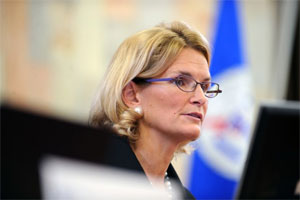|
Geneva, 22 October 2009 |
Not an official record |
N°3 |
|||||||
| « Previous | |||||||||
|
Council Working Group Report on Terminology used in the ITU Constitution and Convention (Document 9)
Meanwhile, the group also liaised with the working group on defining
cybersecurity (see below). Some Member States said the working group on
terminology
should revise and broaden Resolution 67 (Kyoto, 1994) on “Updating of
definitions” and integrate into it the objectives of Resolution 142. It
was agreed that further study on this issue was required. It was also
noted that there is continuing development of a glossary of terms within
ITU. This indicates that the work of the terminology group needs to continue after
the Plenipotentiary conference in 2010.
The group also proposed a possible revision of Resolution 67 (Kyoto, 1994) so that all issues can be defined in the basic instruments of the Union, or added as new Resolutions, and thus facilitate future work in this domain. Reacting to the report, the councillor from the Philippines made a passionate plea to maintain the status quo on the term “telecommunication”, which he argued was broad enough to cover ICT and that it had stood (and will stand) the test of time. “Telecommunication” is currently defined in the Constitution as “Any transmission, emission or reception of signs, signals, writing, images and sounds or intelligence of any nature by wire, radio, optical or other electromagnetic systems.” The Philippines, supported by Canada, the United States, Mali and Switzerland, stressed the need for a stable, but flexible Constitution/Convention. They called for the status quo to be maintained with regard to definitions already included in the CS/CV, with Mali underlining that “stability” was necessary to avoid creating difficulties for Member States in the ratification process. Other vehicles than the Constitution and Convention were proposed and should be studied further to accommodate any change and evolution of terminology linked to the evolution of technology. The Russian Federation recalling ITU’s role in WSIS Action Lines C2 and C5, suggested that the issue be taken on board when reviewing the Constitution/Convention. The Council decided to transmit both this report and the comments made by councillors to the Member States and to the Plenipotentiary Conference in 2010. Definitions and terminology relating to building confidence and security in the use of ICT (Document 7)
Working group delivers its final report Resolution 149 (Antalya, 2006) tasked the Council to establish a working group to study terminology related to building confidence and security in the use of ICT and to examine and develop definitions, as appropriate. It said a final report was to be presented to Council 2009 (including possible amendments to the ITU Constitution and Convention), for transmission to the Plenipotentiary Conference in 2010. The final report of this working group was presented by its Chairman, Nabil Kisrawi. He said it had held four meetings, and had considered inputs from the Secretary-General and the Directors of TSB and BDT concerning use of the term “cybersecurity” in ITU Recommendations, online toolkits, and other documents. Consensus was reached in the working group on using the definition in Recommendation ITU-T X.1205 (04/2008) “Overview of cybersecurity”. This definition is cited in the box below.
The working group also proposed the following options for documenting the definition:
The Council noted the report and will transmit it to the Plenipotentiary Conference in 2010.
Use of the six official languages of the union on
an equal footing (Document 33)
Working group on languages delivers its final report
Since the Antalya Plenipotentiary Conference, this working group has continued to work in close collaboration with the ITU secretariat, monitoring progress reports on implementing the use of the six languages. The group has worked mainly by correspondence and through informal consultations by the Chairman with delegations "representative of and reflecting the six official languages". At the group’s final meeting in June 2009, several
delegations emphasized the status and importance of languages in the
United Nations system, and ITU’s obligation to service multilingual
meetings and make its documentation available in the six official languages.
Noting that, on the whole, the languages are now treated on an equal
footing in ITU, in accordance with Resolution 154, the group made several
recommendations to help continue this positive trend. Russian contribution (Document 79) The Russian Federation also presented its Document 79 on the same subject. The Russian delegation stated that while progress on the issue of languages was noteworthy, there were still shortcomings to be addressed. Highlighting one success story regarding the outcome documents of the World Radiocommunication Conference of 2007, the Russian delegation said: “for the first time, and less than one year after WRC, the Final Acts and Radio Regulations in Arabic, Chinese, French, Russian and Spanish were delivered simultaneously and promptly, and less than two weeks after the English version.” The Russian delegation went on to comment that despite the successes achieved, “the actual situation in regard to the publication of documents in the six languages requires that the ITU secretariat pay greater attention to the timely and simultaneous delivery of certain categories of document in all six languages, in order to afford the ITU membership equitable opportunity to use them irrespective of the language involved”. This, the delegation added, was also valid for Council documents.
The delegation proposed coordination and outsourcing as possible solutions for ensuring the timely and simultaneous distribution of documents. These views were supported by several countries including Mexico, Spain, and China, with Mali adding that outsourcing should apply to the recommendations in section 3 of Document 33 (see box). However, a number of delegations, while agreeing with equal treatment of languages, stressed that simultaneous delivery must not be at the expense of rapid distribution of language versions available. This was the view of Spain, Germany, France and others, including the ITU Secretary-General, Dr Hamadoun Touré, who urged the Council not to insist on simultaneity in the issuing of documents, underlining that this would seriously impede the work of the Union. Sweden pointed out that the late submission of documents by Member
States also has a major impact on timeliness. He suggested that the
Council consider imposing strict submission deadlines (for example, a
cut-off date of one week before a meeting). The proposal was supported
by a number of delegations and welcomed by the secretariat. While agreeing on the value of multilingualism Germany, recalled that the goals of ITU are standardization, radiocommunications and development. The German delegation went on to add that multilingualism was just a tool to achieve those goals, and hence must be subject to budgetary constraints. Many Council Member States also stressed the need to observe multilingualism on ITU's website, stating that at the moment, the use of all six languages was patchy (at best) and certainly far from equal.
Council endorses the recommendations on equality of languages
The working group’s recommendations are reproduced below in their
entirety (with a slight modification shown in bold in recommendation
3.1, as proposed by TSB Director Malcolm Johnson and endorsed by the
Council). The United States sought to know the financial implications
for implementing recommendation 3.1. The Administration and Finance
Department responded that it would cost an estimated CHF 1.545 million.
Draft revised Resolution 154
The draft revised Resolution 154 in Annex 2 of Document 33 recognizes “the importance
of maintaining and improving the multilingual content of services
required by the universal character of United Nations system
organizations and the work accomplished by the Council Working Group on
Languages”. It resolves “to take all necessary measures to maximize
interpretation and the translation of ITU documentation in the six
languages on an equal footing, within the prevailing budget constraints,
although some work in ITU (for example working groups, study groups,
regional conferences) might not require the use of all six
languages.” [Note: The words shown in bold were deleted, as proposed by
BDT Director Sami Al Basheer Al Morshid and endorsed by the Council.]
The report of the working group was approved by the Council and will be transmitted to PP-10 and to Member States for information. Free online access to some ITU publications
At its 2008 session, the Council approved a six-month trial period (January-June 2009) of free online access to ITU-R Recommendations and the basic texts of the Union for ITU Member States, Sector Members and Associates. Jean-Paul Lovato of BR presented Document 63, giving an overview of the impact on revenue during this trial period. Free online access to ITU-R Recommendations resulted in a decrease of CHF 168 000 in sales revenue during the first six months of 2009 (and a one-time forfeited loss of CHF 120 000). It is estimated that if ITU members continue to directly access ITU-R Recommendations free of charge during July-December 2009 , this would represent an additional projected fall of CHF 114 000 in sales revenue, amounting to a total decrease of CHF 282 000 for the year. The following documents were also presented and discussed: Documents 69 from the United Arab Emirates, 84 from Brazil and 81 (Rev.1) from the Russian Federation. Brazil's proposal called on the Council to decide to allow free online access to the Portable Document Format (pdf) versions of ITU-R Recommendations to the ITU membership, universities, research institutions, centres of excellence, students and the general public on a permanent basis. The Russian delegation’s document proposed the endorsement, on a permanent basis, of free online access to the basic texts of the Union and ITU-R Recommendations for ITU Member States, Sector Members and Associates in all Sectors. The discussions that ensued dealt with free online access to either ITU-R Recommendation or to the Radio Regulations. Some other regulatory publications were also mentioned such as the fundamental texts of the Union as well as the International Telecommunication Regulations. While it was unanimously recognized that free online access to some ITU publications would have certain advantages, such as broader international recognition of the Union, several delegations also stressed that this growing trend would impact significantly the Union's sources of funding. In the end, the Council decided that the trial period relating to ITU-R Recommendations will be extended until PP-10 and that the secretariat will continue to study the impact of granting free online access to the basic texts of ITU, including the Radio Regulations, and report the results to the Plenipotentiary Conference that will have the difficult task of analysing and deciding on the financial plan for the 2012-2015 time-frame. Schedule of ITU events 2010-2012 (Document 57)
A schedule was presented to the Council for information. It was generally accepted, but doubts were raised about the burden on 2012. Mali and the United States pointed out the difficulties of holding so many events in one year, and said the schedule needs review. Noting these comments, the Council agreed that the schedule should be referred for consideration again at its 2010 session, after work has also been done on the associated issues described in the following documents 71, 70, 75 and 80.
Scheduling of multiple events in one year (Document 71)
This contribution from the United States cites Resolution 156 (Antalya, 2006) on scheduling conferences and other major ITU events, taking into account the limited financial resources of the Union and the increasing demands placed on administrations and delegates, including the significant preparatory efforts involved for each event. The resolution concludes that the Union’s budget cannot normally sustain more than one world conference or assembly per year. "Since Antalya, the need for economy in conference scheduling has intensified due to the global financial crisis," the US document says. However, the proposed schedule in Document 57 (see above) envisages four global events for 2012, namely: the World Radiocommunication Conference (WRC-12), the Radiocommunication Assembly (RA-12), the World Telecommunication Standardization Assembly (WTSA-12) and the World Conference on International Telecommunications. The US proposes that "as Council prepares for the next biennium and beyond, guidance from the Antalya Plenipotentiary Conference (Resolution 156) on the Scheduling of Conferences should be given due consideration". The Council noted the contribution.
Schedule of TSAG meetings (Document 70)
The document adds that the TSAG meeting should be held every nine months — not once a year, as at present. This is because TSAG needs to meet in the same cycle as study group meetings. It is explained in the document that “having only a single annual TSAG meeting creates a situation where it can take two study group plenary cycles — and potentially a delay of up to a year and a half — for TSAG to be able to respond to an issue regarding coordination or the allocation of work across study groups, reviewing progress and changing priorities, and taking necessary actions.” Director of TSB Malcolm Johnson said that a compromise position had been reached during a meeting of the Standing Committee on Administration and Management on Wednesday, 21 October. In future, TSAG will meet once a year for three days, supported by full interpretation services in six languages. However, there will also be an added fourth day for meetings by working groups, each held without interpreters in a single language. This proposal was supported by the United States.
Putting the Plenipotentiary onto a five-year cycle (Document 75)
From the Russian Federation, this document notes that ITU has a four-year Plenipotentiary Conference cycle, whereas the United Nations has a five-year cycle. Moving ITU to a five-year cycle would make it possible to reduce costs. Moreover, in 2015, it will have been 150 years since ITU was founded, and this event should be celebrated at the highest level. It proposes, therefore, that, in a move to a five-year cycle, a Plenipotentiary Conference should be held in 2015 that also celebrates ITU’s 150th anniversary. The required change would need to be approved by a Plenipotentiary Conference. The Russian Federation also pointed out that holding the five-year cycle would not apply to the World Radiocommunication Conference, as Recommendations from ITU-R cannot be adopted without the conference’s approval; it could — if considered suitable — be applied to the other Sectors' events, as their recommendations do not need to wait for a major conference before being approved. There was much discussion of this proposal by the Council. Australia and the United States found it "very interesting", while Mali and the Republic of Korea pointed to the implications of revising ITU’s basic instruments in this way, for instance upon the terms of elected officials. Moving to a new cycle could save money, but the United Arab Emirates thought that celebrating ITU’s 150th anniversary is not sufficient reason to change. Switzerland said that making Plenipotentiary Conferences less frequent might not be appropriate in the fast-changing world of ICT. The Council agreed to set up a working group on this matter, to prepare proposals for Council 2010 and subsequent consideration by PP-10. The Russian Federation will chair the group.
Increasing the effectiveness of high-level forums in ITU (Document 80)
This document is also from the Russian Federation and proposes to merge all high-level forums into a single ITU high-level event, and to hold the World Telecommunication Policy Forum (WTPF) in conjunction with Telecom World forums (starting with the anniversary event in 2011).
The Republic of Korea noted that the profitability of Telecom events is declining, and their focus needs to be reconsidered; this could be a good time to put more emphasis on the "high-level" aspect of the meetings, as in the Russian proposal. South Africa, however, stressed the value of maintaining the WTPF in its present framework and status, which the delegation considers to be valuable and distinct from Telecom. The Council noted the document, adding that proposals should be considered for PP-10.
Preparations for the World Telecommunication Development Conference in 2010 (Document 53)
BDT Director Sami Al Basheer Al Morshid reported on the preparations for WTDC-10, to be held in Hyderabad, India from 24 May to 4 June 2010. He said that three of the six Regional Preparatory Meetings (RPM) have been held — for the Asia-Pacific, Africa and Americas regions. The remaining three RPMs are scheduled for the Commonwealth of Independent States (in Minsk, Belarus on 23-24 November 2009); for Europe (in Andorra on 1-3 December 2009), and for the Arab States (in Damascus, Syrian Arab Republic on 17-19 January 2010). An inter-sectoral group has been set up to coordinate the preparations for WTDC-10, at which representatives of all three Sectors and the General Secretariat "are working together to ensure an efficient and effective preparatory process that will ensure the successful outcome of the conference," said Mr Al Basheer. The Host Country Agreement between India and ITU was signed at the Council session on Tuesday (see Issue No.1 of the Highlights). Mr Al Basheer detailed the results of a site visit to check on facilities for the conference and delegates, which he described as "excellent". The Council noted the report. Speaking on behalf of India, the Council Vice-Chairman R.N. Jha said that it is "a great honour" for his country to host the event, and he looks forward to welcoming participants.
Preparations for the Plenipotentiary Conference in 2010 (Document 39)
On 11 August 2009, the Secretary-General sent a letter inviting Member States to participate in PP-10. A second letter was sent on 3 September, referring to the proposals for the work of the conference, and calling for candidates for the posts of elected officials, as well as for the Council and the Radio Regulations Board. A letter of invitation was also sent on 3 September to the organizations, institutions and other entities entitled to attend the conference as observers. A portal for the conference has now been set up on ITU’s website at www.itu.int/plenipotentiary/2010 The Council noted the document. The councillor from Mexico said his country is ready to welcome everyone to the conference, where participants at Veracruz will also be able to enjoy sun, sea, singing and margarita cocktails!
Preparations for WRC-12 and RA-12 (Document 41)
Although originally planned for 2011, following consultations with ITU’s membership, the next World Radiocommunication Conference (WRC-12) will take place in Geneva from 23 January to 17 February 2012, preceded by the Radiocommunication Assembly (RA-12) on 16-20 January 2012 in the same venue.
Date and duration of ITU Council 2010 (Document 38)
The document presents a draft Decision that the 2010 session of the Council will open in Geneva for a period of eight working days from 12-21 April 2010. Sweden made the suggestion that the dates be changed so that Council starts on Tuesday 13 April and finishes on Thursday 22 April. This would give greater flexibility to councillors in travelling and in holding any preparatory meetings earlier in the first week. Council approved the suggested amended dates of 13-22 April 2010. Talks on the Dedicated Internet Group continue
An Ad Hoc working group was set up by the Council on Tuesday (see
Highlights 1) to look at proposals (Document 86 from Brazil) on the Role
of the Council’s Dedicated Group on Internet-related Policy Matters.
Chairman of the Ad Hoc group, Brazil's Mário Canazza, reported back that it had met twice on Wednesday
(21 October) — but that
no consensus had been reached on how a proposed Resolution should be
worded to reflect the Dedicated Group’s activities. However, in later
talks with the United States, some amendments to the original Resolution
had been agreed.Councillors praised Brazil’s hard work to solve the impasse. A translation into six languages of the amended Resolution was requested, so that it can be considered again at the next plenary session of the Council. Saudi Arabia contributes to the "Connect a school, connect a community" initiative
 During the Council meeting, a ceremony was held at which Saudi
Arabia’s Deputy Minister of Communications and Information Technology,
Fareed Khashoggi, signed an agreement to provide a financial
contribution to help launch ITU’s "Connect a school, connect a
community" initiative. Saudi Arabia said it is making the contribution
because it "believes in ITU’s founding principles" and that Member
States should help each other. BDT Director Sami Al Basheer Al Morshid
explained that the money (CHF 100 000) would be put towards inaugurating
the project in developing and least developed countries. During the Council meeting, a ceremony was held at which Saudi
Arabia’s Deputy Minister of Communications and Information Technology,
Fareed Khashoggi, signed an agreement to provide a financial
contribution to help launch ITU’s "Connect a school, connect a
community" initiative. Saudi Arabia said it is making the contribution
because it "believes in ITU’s founding principles" and that Member
States should help each other. BDT Director Sami Al Basheer Al Morshid
explained that the money (CHF 100 000) would be put towards inaugurating
the project in developing and least developed countries.
|
|||||||||

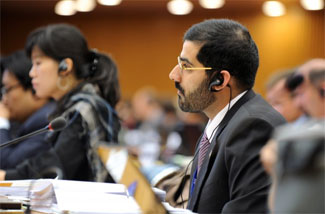
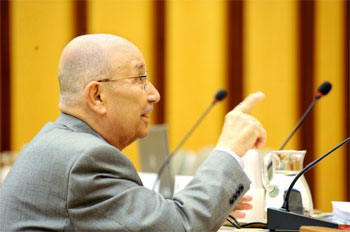
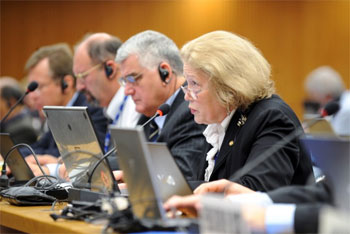 The Russian delegation then underlined that there is a need “to
analyse the current situation in relation to the preparation and issuing
of documents in all six languages of the Union, to make more effective
use of administrative resources and to take all necessary measures to
strengthen coordination for the timely and simultaneous preparation of
documents in the official languages and unconditional implementation of
Resolution 154 (Antalya, 2006).”
The Russian delegation then underlined that there is a need “to
analyse the current situation in relation to the preparation and issuing
of documents in all six languages of the Union, to make more effective
use of administrative resources and to take all necessary measures to
strengthen coordination for the timely and simultaneous preparation of
documents in the official languages and unconditional implementation of
Resolution 154 (Antalya, 2006).” 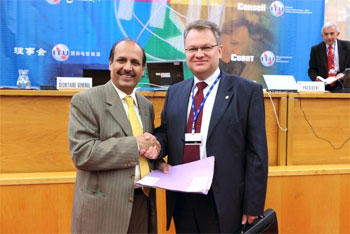
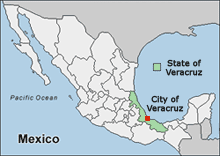 Doreen Bogdan-Martin, Chief of the
Strategic Planning and Membership Department, reported on the status of
the preparations for the Plenipotentiary
Conference (PP-10) that will be held in Veracruz, Mexico, on 4 to 22 October
2010. An agreement between Mexico and ITU relating to the holding,
organization, and financing of the conference was signed in Guadalajara,
Mexico on 23 June 2009 by ITU Secretary-General Hamadoun I. Touré and
Juan Francisco Molinar Horcasitas, Mexico’s Secretary of State for Communications
and Transport. It is the first time in the history of ITU that a
host-country agreement has been signed more than 16 months prior to the
opening of a Plenipotentiary Conference, Ms Bogdan-Martin commented.
Doreen Bogdan-Martin, Chief of the
Strategic Planning and Membership Department, reported on the status of
the preparations for the Plenipotentiary
Conference (PP-10) that will be held in Veracruz, Mexico, on 4 to 22 October
2010. An agreement between Mexico and ITU relating to the holding,
organization, and financing of the conference was signed in Guadalajara,
Mexico on 23 June 2009 by ITU Secretary-General Hamadoun I. Touré and
Juan Francisco Molinar Horcasitas, Mexico’s Secretary of State for Communications
and Transport. It is the first time in the history of ITU that a
host-country agreement has been signed more than 16 months prior to the
opening of a Plenipotentiary Conference, Ms Bogdan-Martin commented.